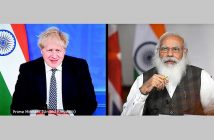The days when expatriate Indians were valued merely for their monetary remittances must surely fade. But India is yet to fully leverage the potential of these 22 million odd global Indian ambassadors at large, who could (and in my view must) play a much more visible and effective part in supporting the country zoom firmly to the world’s top table of nations.
Prime Ministerial frontrunner Narendra Modi struck a chord with audiences at the recently concluded Pravasi Bharatiya Divas (PBD) conference in New Delhi when he eloquently sought to re-define India’s relationship with its non-resident champions.
“When we talk about NRIs, we think that they will bring dollars and pounds. Our Indian brothers and sisters should not be weighed in dollars and pounds. They have a different work culture, global exposure, knowledge and experience. This experience can take us in a new direction,” he said.
How can we turn these words into substantive and sustained action? The PBD itself, meaningful when initially conceptualised and launched under then Prime Minister Vajpayee, has turned into a jamboree of a privileged few who gather to back-slap each other’s achievements. Any real connect with grassroots India and overseas Indians is conspicuously absent, as a result of which we are missing out on creating an effective convergence point and ideating platform for global Indians.
And, that in itself is an important concept we must cultivate for the 21st century – the Global Indian. It is important to move away from cynical statements that have often ridiculed NRIs as “Non-Required” Indians. The point is that they are very much desired and indeed required if India is to take its rightful place on the world platform. People of Indian origin are in positions of power and influence across the world and should be regarded as partners and bridge-builders to enhance India’s influence on a global stage.
For anyone who has obtained or tried to obtain an Overseas Citizen of India (OCI) card will testify that the high commissions and embassies are homes to a public relations nightmare and speaks volumes of the country’s attitude towards its global citizens.
The NRI’s right to vote in the country’s elections is an equally overdue sticking point for the nearly 8 million Indian citizens living outside India. According to the ‘Representation of the People (Amendment) Act 2010’, they are eligible to vote in Indian elections, however, only if they are present in their respective constituencies on the day of elections! This again is a major disconnect with the realities of today when special ballot voting has been working effectively for scores of countries like the UK, US, Canada and even Thailand and the Philippines in the neighbourhood.
There is in my view an urgent need to re-invigorate this relationship between India and the Global Indian. If the Indian government genuinely believes in the vision of PBD, I have five practical suggestions:
1. Put in place without delay the practical set-up that will enable Indian citizens living abroad to exercise their right to vote.
2. Allocate two nominated seats in the Rajya Sabha for OCIs; this will provide a global perspective to proceedings and a channel to advocate the hopes, aspirations and ideas of India’s Diaspora.
3. Launch a major global cultural and educational initiative, ‘The Indian Council’, along the lines of the British Council to galvanise India’s global soft power. We have organisations such as the Bharatiya Vidya Bhavan and the Nehru Centre in the UK doing great work. But India needs to be much more strategic and far-reaching in its global engagement.
4. Bring life back into the PBD project; why not have mini PBDs in countries outside India where a larger number of people from diverse backgrounds can participate? Also, consider specific conclaves such as a ‘Global Indian Legislators Conclave’ to discuss global political issues and brief Indian-origin politicians from around the world on India’s foreign policy and seek strategic inputs.
5. Aggressively encourage and enable institutions such as the world class Indian Institute of Management to establish campuses abroad, and to encourage foreign students from around the world to study at Indian campuses. This will build long-term and sustainable people-to-people relationships.
The time for action is now. Both India and its Diaspora need to decide whether the relationship is significant enough to renew vows? Or is it merely a marriage of convenience?







